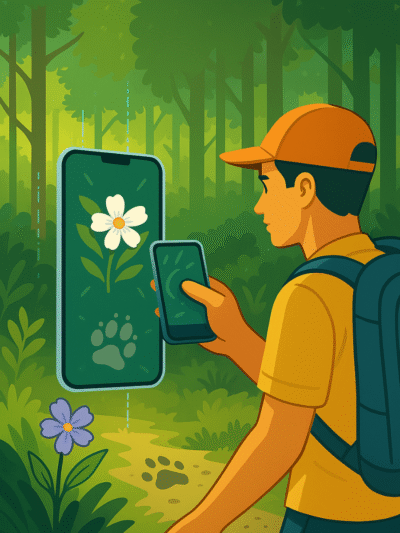🚀 AI Is Redefining Nature Walks in 2025
Did you know more than 2.6 million nature observations were made using AI in Canada last year?
Welcome to the future of exploration, where your smartphone can instantly identify wildflowers, birds, insects, and more using artificial intelligence.
Whether you’re hiking the Rockies or strolling through Nose Hill Park, AI local flora and fauna identification is making every outdoor moment smarter and more immersive.
With just a snapshot, you’ll gain instant insights, contribute to global biodiversity databases, and enjoy nature in a deeper, more informed way.
Let’s explore how it works!

📘 Table of Contents
❓ How Does AI Identify Plants and Animals?
AI uses pattern recognition and machine learning to identify wildlife and plants from photos.
AI systems are trained on millions of images of leaves, flowers, animals, and even tracks. When you take a photo, the app compares it to this data.
Computer vision algorithms break down the image into key features like leaf shape, fur patterns, colour, and structure.
Tools like iNaturalist and Pl@ntNet then offer the most probable matches in seconds, often with high accuracy.
🔍 What Are the Best AI Identification Apps?
iNaturalist: The Crowd-Sourced Leader in AI Nature ID
Available for free, it uses a blend of AI and community confirmation. Great for both plants and animals.
It helps build global biodiversity records. Observations are verified and sometimes used in peer-reviewed studies.
Works offline in basic mode, with more features unlocked online.
Seek by iNaturalist: Instant, No-Login AI Nature Recognition
Designed for beginners and kids, Seek gives instant results without needing to sign in.
It awards badges, tracks your discoveries, and supports voice search commands like “Identify this flower”.
Perfect for casual use on weekend hikes.
Pl@ntNet and Flora Incognita: For Plant Lovers
Pl@ntNet is especially powerful for native plants in Canada. You can search by flower, leaf, fruit, or bark.
Flora Incognita works offline and excels in high alpine and boreal forest identification.
Both are ideal if you’re more interested in wildflowers or forest biodiversity.
🧭 For a comparison of these apps, see our guide to AI-powered hiking gadgets.
🏞️ Where Can I Use AI for Flora and Fauna?
Local Parks and Trails Across Alberta
Calgary’s Nose Hill Park, Fish Creek, and Edworthy Park are great testing grounds for plant ID.
Jasper and Banff are home to diverse species, and these tools help avoid misidentifying protected flora.
You can even use them in your own backyard to identify bees, moths, and garden plants.
Camping and Crown Land Adventures
If you’re camping on Crown land, you’ll often encounter unknown shrubs or tracks, and now you can use AI to solve the mystery.
For example, while exploring near Clearwater River, you can compare wildlife tracks to AI databases.
🗺️ Learn more in our guide on Camping on Crown Land in Alberta.
🌱 Why Is AI Nature ID Important?
For Learning and Conservation
AI local flora and fauna identification helps kids and adults learn the names and importance of species around them.
It builds a deeper respect for nature — when you know something’s name, you’re more likely to protect it.
Some tools also report invasive species, helping communities respond to ecological threats.
For Citizen Science Projects
Many apps contribute data to research groups and universities. Your sightings can aid global tracking of climate change and species shifts.
AI tools often include GPS tagging and date stamps — this helps build accurate environmental maps.
🌿 Bonus: Our article on AI in Environmental Conservation goes deeper into the tech that powers these changes.
🌍 How to Contribute to Science with AI Observations?
Upload, Tag, and Share Your Findings
Once the app suggests an ID, you can confirm and submit it to public databases like GBIF or Canadensys.
Tag your observations with accurate habitat and location notes to increase scientific value.
Use hashtags and upload photos through the app to share on iNaturalist or social platforms.
Join a BioBlitz or Local Nature Event
BioBlitz events encourage the public to document species in a given area over 24–48 hours.
AI tools dramatically improve the speed and confidence of identification during these events.
📅 Watch for events hosted by local organizations like Alberta Biodiversity Monitoring Institute or Nature Alberta.
📘 AI Local Flora and Fauna Identification Terms
If you’re new to the world of AI-powered nature tools, getting familiar with key terms is essential.
Our glossary breaks down important concepts like computer vision, citizen science, geotagging, and biodiversity tracking—all in one place.
It’s a helpful resource for anyone looking to better understand how AI local flora and fauna identification really works.
🧠 Conclusion: Why AI Local Flora and Fauna Identification Is a Game-Changer
AI local flora and fauna identification is transforming how Canadians explore nature.
With just your phone, you can scan, learn, and even contribute to global research in real-time.
Whether you’re a hiker, camper, teacher, or curious observer, this tech brings the natural world closer than ever before.
Ready to explore your world with sharper eyes? Download one of the AI apps mentioned above and start your smart nature journey today!
🛡️ AI Local Flora and Fauna Identification Affiliate Disclosure
Some links in this post may be affiliate links. As an Amazon Associate and partner with other programs, I may earn a commission if you make a purchase, at no extra cost to you. I only recommend tools and gear I believe in.
